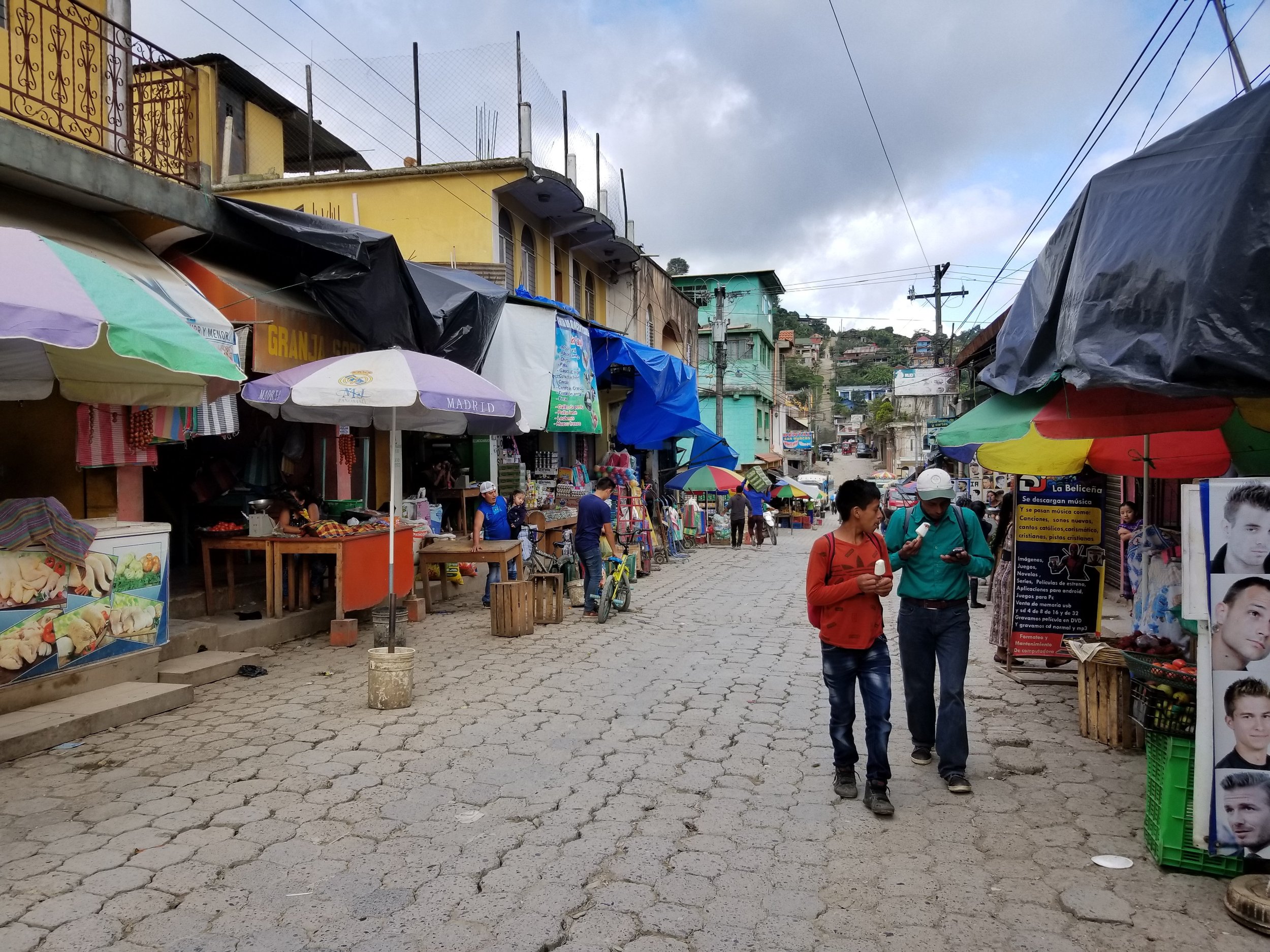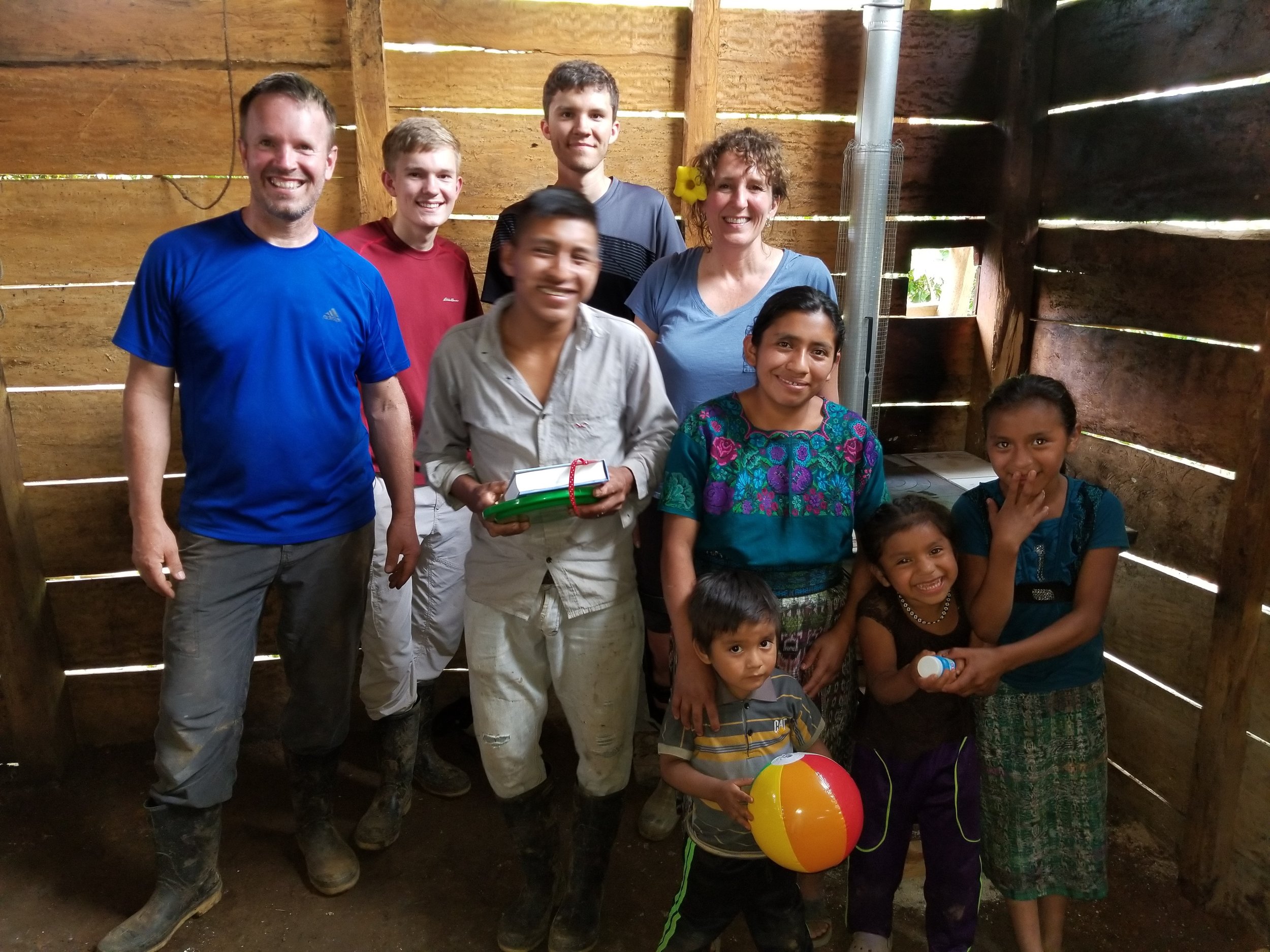Christie Lindstrand: Sustenance
Driving across Guatemala is an opportunity to take in the reality of a third world economy. The infrastructure, the nature of business, the challenge for all. Everyone seems to be just narrowly surviving. No indications of wealth nor excess. Tired vehicles, tired roads, tired buildings—hope demonstrated in iron rebar stretching to the sky above every single floor dwelling. Do they represent plans unfulfilled or dreams yet accomplished? Impossible to discern. But what’s the difference, really? The observation I have is in the contrast with home in Washington; something I’ve never experienced: sustenance living. Only just enough for today. In our economy, hard work is rewarded with more than we can consume, more than we can store, more than is good for us in so many ways. Here there is none of that. Just surviving today. Small servings, single doses of medicine, dirt floors, one light bulb or outlet. It shocks me. What can I bring these people that will ever bring balance? I’m overwhelmed. But I do know that our small offering of two weeks, 60 stove builds, bibles and toys, can generate precious hope and love and caring. I can’t change their economy, but I can sincerely hug them and offer a bit of myself.
Craig Lindstrand: Weight Lifting
When we started our stove installation project, our family formed one of four installation teams. Our team included a HFPM representative, as well as a villager to lead us to the homes where the stoves waited for assembly. Juan-- or “our Juan” as we affectionately referred to him—was a young father of small stature and pleased with his role as our host. Each day, we would work together to install five or six stoves in huts sprinkled about the jungle. As he led the way on the muddy paths between these humble homes, Juan always took care to point out items of special interest: cardamom pods, a small duck tied to a tree, a beautiful view.
Nearing the completion of our second day, we arrived at Juan’s family compound. Upon arrival, he introduced us proudly to his parents, brothers, wife and small daughter. Then he ushered us on a personal tour of their homes and courtyard, and included impromptu gifts of flowers from their tree, freshly cut sugar cane and small, sweet bananas. His guided survey ended in a open area next to the house where he led us to his homemade weight bar: a piece of steel with two fixed concrete rounds on either end. Smiling, he demonstrated his prowess with 10 quick curls of the bar. Next, he invited us to try. First Colton, 15, attempted to pick it up. No luck but plenty of good-natured laughter. Then Curtis, 19, stepped in. He managed a few curls through struggling effort, maybe 5. He appreciated the magnitude of Juan’s accomplishment. Next it was my turn. I was able to churn out a few more than any of them. More laughter, congratulations, and smiles all around. A fun game: an opportunity to show us that Juan was proud and strong and happy—and he didn’t need material wealth to show it.
An Engineer’s perspective on Hands for Peacemaking initiatives
As a retired engineer and board member for Hands for Peacemaking Foundation I am continually amazed at the engineering inventiveness of our Guatemala team.
The Aller stove continues to be upgraded for efficiencies (less wood, less time collecting wood and many fewer trees cut down) along with the health benefits of ducting the smoke to the outside. Engineering challenges include better fire brick, better stove pipe designs and materials to increase draft and lessen corrosion problems. Chemical and Mechanical Engineering for heat transfer, metal preparation, gas flows and materials of construction.
Water systems, collection of rainwater during the wet season, and stored in tanks for the dry season. Structural concerns for the tank foundations, a sturdy support for the collection (simple but elegant use of corrugated steel with an aluminum/zinc alloy coating to minimize corrosion to avoid lead that might be present in traditional galvanized steel). Final treatment of the water before use with a simple but effective filter. Civil engineering/Environmental engineering for structures and water quality
The new manufacturing facility in Quetzaltenango (Xela) for increased production of the stoves, to meet a national and regional demand to get away from open fires for cooking. Industrial Engineering is required to optimize production and material flow, mechanical and civil engineering for tooling and structures.
All these projects require engineering (a lot of it done by the team in Barris). HFPF not only helps with the funding of these projects, but also for technical support from partners like Burn Design Lab, City University, and a successful intern program with Western Washington State University.
Education, construction of schools in the villages and skills training in the manufacturing facility in Barrias such as metal working and welding.
The sum of all these initiatives allows our partners in Guatemala to provide health, economic and educational opportunities to the villagers that would not be available otherwise.
HFPF also returns to the villages to repair, service, provide more training and take data to keep our commitment going and to continually improve the products based on customer use.
Steve Drury
Chem. E. P.E. (retired)
Tyson Boucher, Participant (Board Member)
It is hard to describe exactly what Hands for Peacemaking does for the rural communities of Guatemala. From the very first interaction it is apparent that Hands for Peacemaking was not like other organizations operating in developing nations. They weren’t strongarming communities into getting infrastructure they didn’t need, they weren’t outsourcing work to offshore factories, and they most definitely were not insensitive to the cultures of the people surrounding their operations. It was as if they had taken the traditional, invasive, methods of many organizations of the past and flipped it on its head. Villages reach out to Hands for Peacemaking indicating need, all preliminary building and other work is conducted using local help in Guatemala, and participants are immersed in the culture of the people they are helping. It is truly a gift to work for and with such a great organization.
In 2019 I participated in a trip to Guatemala where my group and I installed 89 Aller stoves in rural communities outside of Barillas, Guatemala. It was truly an experience I will never forget. It opened my eyes to the ease of which people can change the lives. When installing these stoves, it became apparent that we were not just installing the stoves for the families then and now, but that we were installing stoves that would impact these families for generations. The kids that received stoves from our trip would likely tell their kids and their kids will likely tell theirs and so on and so forth. That the simple act of installing a stove with the aid of Hands for Peacemaking could bring about such profound change to the lives of the Guatemalan people is truly mind boggling. It made me realize that even without participating in a trip per say, one could donate the amount of money for a stove and change the lives of people across the continent. Its that simple.
Emily Ell, Participant (Board Member)
I first participated in a Hands for Peacemaking trip in 2019. At that time several Rotaract Clubs were able to raise $80,000 for a trip to build stoves for a village. At first, I was just excited to see more of the world and about the positive impact the stoves would have. I had seen many presentations and graphics about how these stoves reduced carbon impact, saved money for the villagers, and reduced child respiratory disease.
One of the days we were in the village we finished early, and the local soccer team challenged our group to a game. We hiked through fields of sugar cane and came upon a bumpy gentle slope about the size of a soccer field. We played soccer there for a while, I can’t remember who won, probably the Guatemalans, but I will never forget playing on that field in the mountains.
Every time I think back to this trip, I am humbled and grateful that I got to go and have this experience. Hands for Peacemaking leaves a lasting positive impact on anyone involved in their initiatives.
Greg Dirks- Participant Rancho Palmeras Team 2022
We traveled about 30 hours hours across three days to arrive at Rancho Palmeras, a remote village in the mountainous Western Highlands region of Guatemala.
To be honest, I wasn’t fully committed to this trip at first. There were many reasons to say no – a global pandemic, little time to plan, and of course the commitment of time and raising money. I didn’t fully understand why I was there until I stepped off the bus in Rancho Palmeras.
The entire village of about 500 people was there to celebrate the arrival of our small team. We were greeted with handshakes, warm embraces, and speeches and prayers from the village leaders, who knew we had come to bring friendship and warmth from a world so different from theirs that it would probably be difficult to convey, even if we could speak their language.
Yet we did speak the same language, the language of Christian love. It was not just the love from our small team of 9 people, but the love from the larger community supporting us in so many significant ways. We installed or donated 125 stoves, 125 water filters, 2 water tanks, 132 school desks, four white boards, 135 children’s gift bags, and eyeglasses to the village because of this love.
As I began to reflect on my experiences, I started to have flashbacks of the differences between my physical surroundings in Seattle and those I experienced in each village home. We literally had to dig on very uneven dirt floors and level the ground to install many of these stoves. Some of the homes were filled with smoke. There were no real windows, the exterior walls were made from slats of wood with wide gaps and the tin roofs were often encrusted with tar from poorly ventilated stoves and open fires. There were few men in sight while we worked – they were out in the fields harvesting the food that their families would need for their next meals.
Yet the people of the village seemed happy. The kids followed us wherever we went and were eager to prove that they had learned our names correctly at the opening ceremony. The villagers assigned people to work side by side with us as we built the stoves. The kids were delighted when we played soccer with them and surrounded me when I tried to teach them to juggle. They gave us wheelbarrows full of coconuts, chickens from their yards, the sweetest pineapple imaginable, and even a huge tray of warm, fresh kiln-baked bread. Some cried tears of gratitude as we left their home with a fully assembled stove and water filter, homemade hot pads, a maybe a baby blanket if there was a baby or expectant mother. God’s love was very evident in that village last week.
It is easy to insulate ourselves from those who need us. Barriers of culture, distance, and the enormity of the world’s problems can easily cause us to shake our heads and turn to the next story. I returned from this trip with a greater understanding that we don’t have to simply turn to the next page or say a brief prayer and move on. We can each have an impact and embrace others as they make theirs. It may be building a stove in Guatemala, a tiny home in Seattle, organizing others to act in His name, or simply advocating for someone who can’t advocate for themselves. We have each been given the power to make improvements within our own village, however we define it. I pray that God will use me to make continued improvements in mine.









